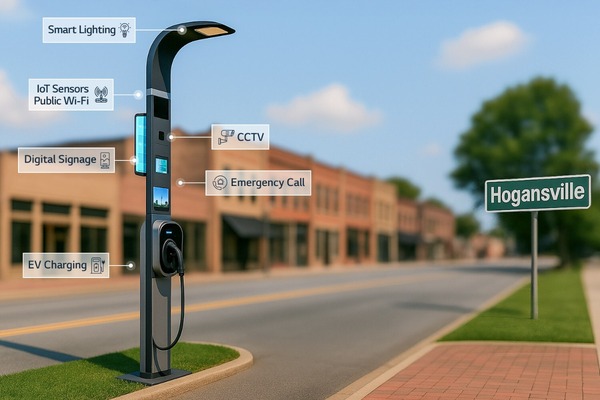Time:2025-07-18 Browse:46

Cities worldwide are increasingly adopting smart streetlights as a cornerstone of modern urban infrastructure, transforming public spaces into hubs of innovation and sustainability. These advanced lighting systems, equipped with Internet of Things (IoT) technologies, are not only improving energy efficiency but also enhancing public safety, connectivity, and overall quality of life. Recent developments in smart streetlight projects across various cities highlight the transformative potential of this technology.
Smart streetlights are revolutionizing urban lighting by integrating LED technology, motion sensors, and data analytics. Unlike traditional streetlights, which operate at full brightness regardless of conditions, smart lights can adjust their intensity based on real-time factors such as pedestrian movement, traffic flow, and ambient light levels. This adaptability significantly reduces energy consumption, making smart streetlights a key component of cities’ sustainability efforts.
Moreover, these systems collect valuable data on everything from air quality to traffic patterns, providing cities with actionable insights to optimize infrastructure and services. For instance, smart streetlights can detect overcrowding in public spaces and alert authorities to potential safety concerns, enabling proactive urban management.

Shenzhen, often regarded as a pioneer in smart city development, has implemented one of the largest smart streetlight projects in the world. The city has replaced over 200,000 traditional streetlights with energy-efficient, IoT-enabled lights. The system integrates solar power, wireless communication, and cloud-based management, allowing for remote monitoring and maintenance. Since the rollout, Shenzhen has achieved a 60% reduction in energy consumption for streetlights and an annual savings of over $20 million. The project has also improved public safety, with real-time surveillance capabilities helping to reduce crime rates in illuminated areas.
Barcelona has embraced smart streetlights as part of its broader "Smart City" initiative. The city’s streetlights are equipped with sensors that collect data on air quality, noise levels, and pedestrian traffic. This information is used to optimize urban services, such as waste collection and public transportation. Additionally, the lights serve as a platform for 5G connectivity, enabling faster and more reliable internet access in public spaces. Barcelona’s smart lighting project has not only improved energy efficiency but also created a more connected and responsive urban environment.
Amsterdam has taken a unique approach to smart streetlights by integrating them with other smart city solutions. The city’s "Smart Lighting" project uses motion-activated lights to conserve energy while maintaining safety in low-traffic areas. Furthermore, the streetlights are designed to host additional sensors, such as those for monitoring air quality and detecting illegal dumping. This multi-functional approach aligns with Amsterdam’s goal of creating a sustainable and resilient urban ecosystem.
In the United States, the city of Austin has launched a pilot project to test smart streetlights in its downtown area. The lights are equipped with sensors to monitor traffic flow, detect emergencies, and provide real-time updates to city officials. The project has already shown promising results, with a 30% reduction in energy consumption and a noticeable decrease in late-night crime in illuminated areas. Austin’s initiative is part of a broader effort to position the city as a leader in smart city innovation.
Singapore, often hailed as a global leader in smart city development, has integrated smart streetlights into its "Smart Nation" initiative. The city-state’s streetlights are equipped with sensors to collect data on weather conditions, air quality, and pedestrian behavior. This information is used to optimize urban services, such as waste management and public transportation. Singapore’s smart lighting system also includes features like adaptive brightness and remote monitoring, ensuring energy efficiency and reliability.
The adoption of smart streetlights is not limited to large cities; smaller towns and municipalities are also benefiting from this technology. By reducing energy consumption and operational costs, smart streetlights enable cities to allocate resources more effectively. Additionally, the data collected by these systems provides valuable insights for urban planning, helping cities to address challenges such as traffic congestion, pollution, and public safety.
As smart streetlights continue to gain traction, the technology is expected to evolve further. Future iterations may incorporate features like solar power integration, enhanced data analytics, and even autonomous maintenance capabilities. These advancements will not only improve the efficiency of urban lighting but also contribute to the development of smarter, more sustainable cities.
In conclusion, smart streetlights are more than just an upgrade to traditional lighting systems; they represent a paradigm shift in urban infrastructure. By combining energy efficiency, data-driven insights, and enhanced functionality, these systems are paving the way for a new era of smart city development. As more cities adopt this technology, the global impact of smart streetlights will continue to grow, illuminating the path toward a more connected, sustainable, and livable future.
Copyright ©2025 Guan Ze Technology Co.,Ltd All Rights Reserved. XML